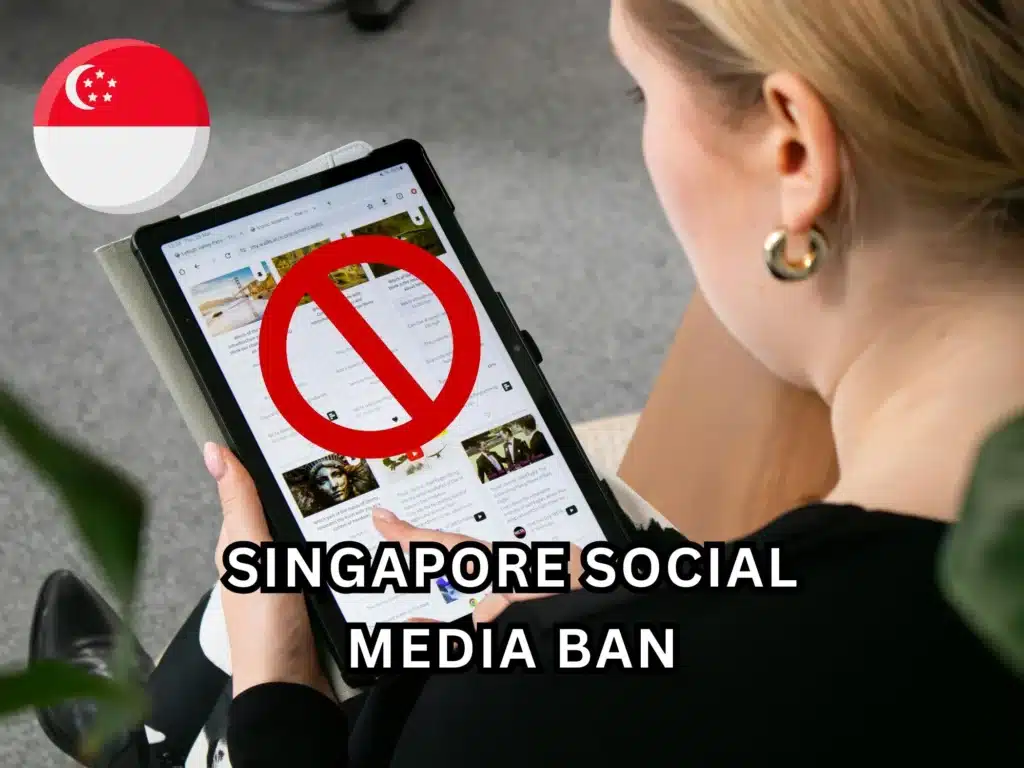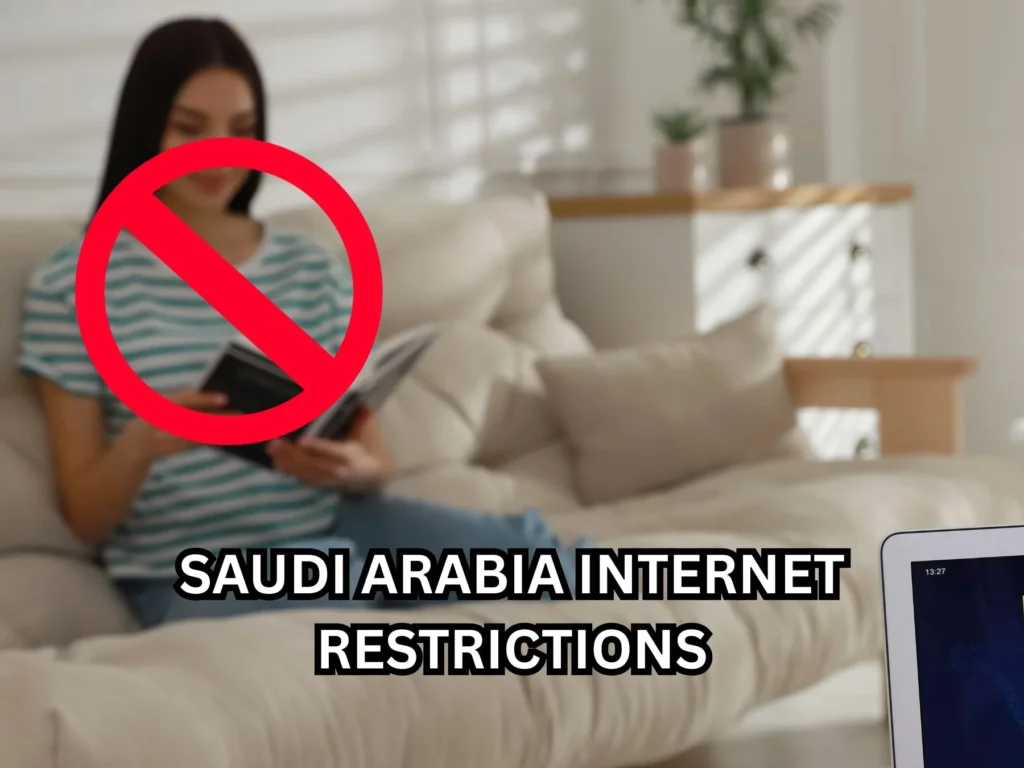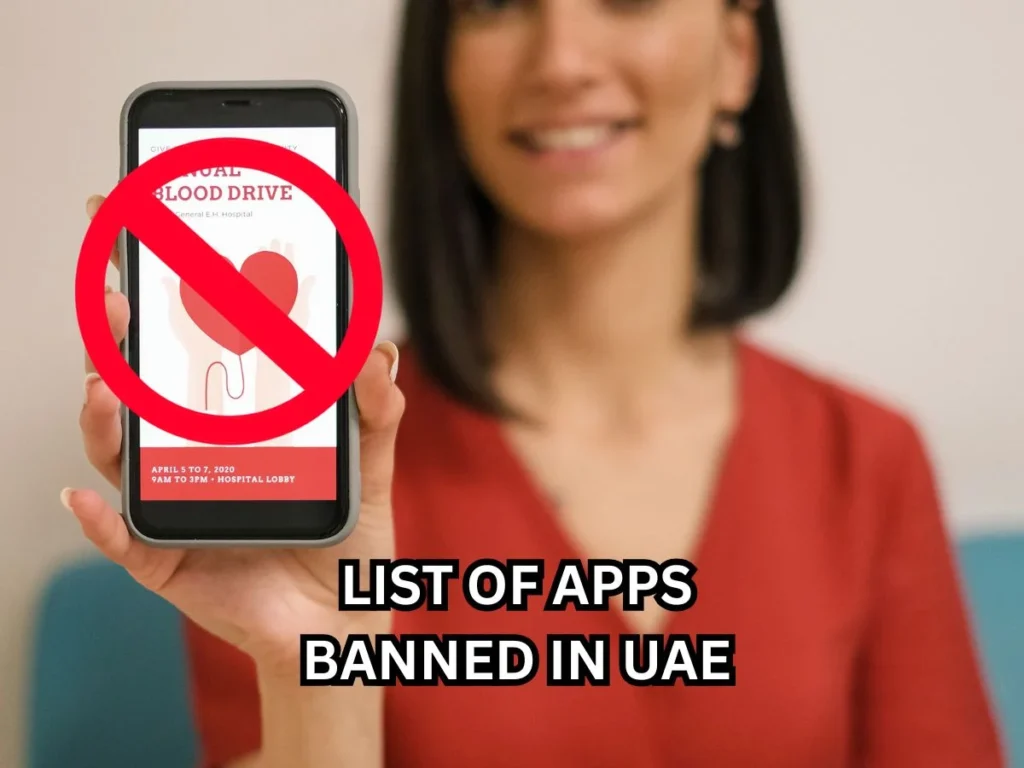Singapore Social Media Ban: 7 Shocking Impacts on Daily Life

Introduction The digital age has brought people closer than ever. Social media has become an everyday part of life. From sharing moments to expressing opinions, platforms like Facebook, Instagram, and TikTok have become powerful tools. But what happens when a country decides to limit or stop access to them? The Singapore social media ban has sparked intense discussion. It affects individuals, businesses, and the whole digital landscape. Understanding this move is essential to grasp its wide-reaching effects. What is the Singapore social media ban? The Singapore social media ban refers to the restrictions placed on access to popular social platforms. This means people in Singapore may face difficulties using or logging into these apps. In some cases, the platforms may be blocked entirely. The government may take these steps due to political, social, or security reasons. While temporary or permanent, such a ban brings significant changes to how people connect online. Social media bans can include limits on posting, restrictions on viewing certain content, or full shutdowns. The goal behind these actions is usually to maintain public order or protect national interests. The Singapore social media ban has raised questions about freedom of speech, access to information, and online expression. Top Benefits of the Singapore social media ban While it may seem negative at first glance, the Singapore social media ban also has certain benefits. These depend on perspective and context. Here are a few positive aspects some supporters point out: 1. Reduced Misinformation False news and misleading content spread quickly online. The Singapore social media ban can slow this down. It allows authorities to control dangerous rumors during sensitive times. 2. Improved Focus and Productivity Without social media distractions, people might spend more time on meaningful tasks. Students, employees, and even families may experience better focus. 3. Enhanced National Security During times of unrest or sensitive national events, the ban can protect citizens. It prevents panic and curbs the spread of harmful content. 4. Mental Health Improvement Social media often causes anxiety, stress, and low self-esteem. A break, even if enforced, might bring mental peace to users. 5. Promotes Real Conversations When people aren’t glued to their screens, they’re more likely to connect in person. It can bring families and communities closer. How to Adjust to the Singapore social media ban – Step-by-step Adapting to the Singapore social media ban can be challenging, especially for those who rely on it daily. Here’s a step-by-step guide to stay connected and productive: Step 1: Shift to Alternative Communication Tools Apps like Telegram, Signal, or email can help stay in touch with friends and family. These platforms may not be affected. Step 2: Explore Offline Hobbies Pick up reading, writing, or even learning a new skill. Use the free time to do things that social media used to replace. Step 3: Stay Updated Through Traditional Media Watch TV news, listen to the radio, or read newspapers. These remain reliable sources of information during digital blackouts. Step 4: Use VPNs Cautiously Some try to bypass restrictions using VPNs. However, doing this can be illegal or unsafe. Always understand the legal risks before using such tools. Step 5: Support Local Businesses Without Social Media Many local businesses depend on social platforms. Reach out directly, visit their stores, or call them instead of using social platforms. Common Mistakes to Avoid During the Singapore social media ban Adapting to change isn’t always easy. Here are common mistakes to avoid: 1. Relying Heavily on Unverified Apps Many new apps may claim to offer access. Avoid downloading unknown apps that may pose security risks. 2. Spreading Panic Don’t share unconfirmed rumors with others. It increases fear and confusion. 3. Ignoring Mental Health Sudden disconnection can lead to loneliness. Talk to friends, join local events, or reach out to support groups. 4. Breaking the Law Using tools like VPNs or proxies without knowledge of the rules can get you in trouble. Know the regulations before taking action. 5. Neglecting Real-Life Relationships While trying to get back online, don’t forget the people around you. Spend quality time with family and neighbors. Smart Tips and Tricks to Cope There are many creative ways to make the most of this situation. Here are some smart ideas: 1. Start a Journal Writing your thoughts helps process emotions. It’s a great way to reflect during the Singapore social media ban. 2. Build a Personal Website Instead of relying on platforms, create your own space online. You can share blogs, photos, and updates independently. 3. Host Community Meetups Organize small local gatherings to share updates and support one another. It strengthens bonds offline. 4. Learn a New Digital Skill Use the free time to study coding, design, or marketing. This can improve your career prospects post-ban. 5. Subscribe to Newsletters Many websites offer email-based updates. Subscribe to stay informed without using social media. Real-Life Relevance of the Singapore social media ban The Singapore social media ban isn’t just a headline. It has a deep impact on everyday life. Businesses that depend on social media for sales and marketing feel the heat. Influencers and content creators lose their platforms. Students miss their communities. Yet, it also forces people to look beyond their screens. The ban encourages face-to-face conversations. Families reconnect. Local news becomes relevant again. People start attending events instead of just scrolling. It’s a reminder that life happens offline too. For small businesses, it’s a chance to create personal relationships with customers. For schools and colleges, it’s time to promote offline clubs and debates. In many ways, the Singapore social media ban rebalances our lives. Conclusion The Singapore social media ban is more than a digital block—it’s a moment of reflection. It challenges our habits and pushes us to find new ways to connect, learn, and grow. While it has downsides, it also opens doors to possibilities we’ve forgotten. Whether the ban is short or long, it teaches us the importance of balance. We must learn to live meaningfully with or without social platforms.
Top 7 Things to Know About Saudi Arabia Internet Restrictions

Introduction The internet is a powerful tool for communication, learning, and entertainment. But in some parts of the world, access to it is limited. One such example is Saudi Arabia. Many people are curious about Saudi Arabia internet restrictions and how they affect daily life. This blog will guide you through what these restrictions mean, how they work, and how people in Saudi Arabia manage their online activities. What is Saudi Arabia Internet Restrictions? Saudi Arabia internet restrictions refer to the rules, filters, and controls the government applies to internet usage in the country. These restrictions are meant to block content that is considered harmful, illegal, or inappropriate by Saudi authorities. Websites, social media apps, and even some messaging services are often monitored or limited. The main purpose of these restrictions is to align internet content with the cultural, religious, and political values of the country. For everyday users, this means that not all global websites or apps are freely available. The internet is filtered, and certain content is blocked to ensure it does not go against public morals or national security. Top Benefits of Saudi Arabia Internet Restrictions Although restrictions may seem like a limitation, there are some benefits to having such a system in place. 1. Protecting Cultural Values: One major benefit of Saudi Arabia internet restrictions is the preservation of local culture and traditions. By controlling content, the country ensures that foreign values do not negatively influence its citizens. 2. Reduced Access to Harmful Content: Many websites that promote violence, hate speech, or inappropriate material are blocked. This can protect children and young adults from harmful online influences. 3. Cybersecurity Measures: Saudi Arabia internet restrictions also help reduce cyber threats by limiting access to websites that may carry malware or scams. This adds a layer of online safety. 4. National Security: The government uses restrictions to prevent the spread of information that could threaten national unity or promote political instability. This helps maintain peace and order. 5. Encouraging Local Development: With limited access to some international platforms, local developers and companies are encouraged to create alternative apps and websites, boosting the country’s tech industry. How to Start or Deal with Saudi Arabia Internet Restrictions – Step-by-Step For people living in or traveling to Saudi Arabia, dealing with internet restrictions may feel challenging. Here are some practical steps to navigate the system while respecting local laws: Step 1: Understand the RulesStart by learning what types of content are restricted. News, adult content, and politically sensitive material are often blocked. Step 2: Use Approved ServicesStick to websites and apps that are legally allowed. The government provides a list of approved communication platforms. Step 3: Be Careful with VPNsVirtual Private Networks (VPNs) are used by some to bypass restrictions, but using them may not be legal. Always stay updated on local laws before using any such service. Step 4: Use Local AlternativesMany international services have local versions in Saudi Arabia. These are usually safer and more aligned with national guidelines. Step 5: Stay InformedThe digital space changes fast. Make sure you keep track of updates and changes in Saudi Arabia internet restrictions to avoid any legal issues. Common Mistakes to Avoid 1. Ignoring the RulesTrying to access restricted content without knowing the consequences can lead to serious trouble. Fines and penalties are common. 2. Overusing VPNs Without KnowledgeMany people install VPNs without understanding the legal risks. In Saudi Arabia, some VPN use may be illegal. 3. Relying Only on International AppsNot exploring local apps or services can make your digital experience more frustrating. Local platforms are often designed to meet specific needs. 4. Sharing Blocked ContentEven if you can access blocked content, sharing it on social media or messaging apps can get you into legal trouble. 5. Thinking Restrictions are the Same EverywhereWhat is allowed in one country may not be allowed in Saudi Arabia. Always check local guidelines. Smart Tips and Tricks 1. Bookmark Trusted Local WebsitesThis will help you access important information quickly without running into blocked pages. 2. Use Government PortalsThese are useful for official services like health, education, and payments, and are fully accessible. 3. Educate Family MembersTeach kids and elders about safe browsing and the types of content to avoid. 4. Keep Backup Communication AppsSome apps might stop working suddenly. Have alternative apps ready for staying in touch with friends and family. 5. Use Encrypted Messaging Within LimitsApps like WhatsApp are allowed, but use them responsibly and legally. Real-Life Relevance Saudi Arabia internet restrictions affect various parts of life. Students may find some educational sites blocked, so they rely on approved platforms. Businesses must adapt by using local hosting and tools. Travelers need to prepare for different internet rules compared to their home country. People often adjust quickly. Many residents turn to local apps for food delivery, shopping, and entertainment. Digital habits are shaped by what’s available and allowed. Despite the limits, people stay connected, work remotely, and even grow online businesses. The restrictions may feel inconvenient at first, but they also teach people how to use the internet more wisely and safely. Over time, users find creative ways to stay informed, entertained, and productive. Conclusion Saudi Arabia internet restrictions are a unique part of the country’s digital landscape. They are designed to protect cultural values, enhance security, and promote responsible internet usage. While these restrictions can be challenging, many people learn to adapt by using local tools, following the rules, and staying informed. Whether you live in Saudi Arabia or plan to visit, understanding how Saudi Arabia internet restrictions work will help you make smart choices online. Stay safe, stay informed, and use the digital space responsibly. This article is brought to you by Interclever, your trusted source for digital knowledge and tips.
Top 15 List of Apps Banned in UAE You Must Know Before Traveling

Introduction Have you ever been surprised when an app on your phone suddenly stops working in a new country? It happens more often than you might think, especially in places like the UAE. While the UAE is known for its advanced technology and modern lifestyle, it also has strict rules when it comes to apps. This blog will take you through the full list of apps banned in UAE and help you understand why these restrictions exist. What is the List of Apps Banned in UAE? The list of apps banned in UAE refers to mobile or web applications that the government has either fully blocked or restricted for public use. These bans are usually put in place for reasons related to national security, cultural values, or local laws. The aim is to ensure that apps used by residents align with the country’s privacy rules, moral codes, and safety measures. The banned apps can include messaging platforms, video calling tools, social media networks, and even certain games. Some of these apps are restricted due to concerns like data privacy, unlicensed VoIP services, or inappropriate content that doesn’t fit with UAE’s cultural values. Top Benefits of Knowing the List of Apps Banned in UAE Being aware of the list of apps banned in UAE helps you avoid sudden disruptions. Imagine moving or traveling to the UAE and not being able to contact family through your usual app. If you know what’s banned, you can prepare alternatives. It also helps app developers and marketers make smarter choices. If your business relies on a banned app, you can lose access to your customers overnight. Awareness can help businesses find legal alternatives to stay connected. Knowing this list can also keep you out of legal trouble. Using banned apps through VPNs or other tools might seem harmless, but it could lead to fines or worse. Staying informed protects your digital habits. How to Start Understanding the List of Apps Banned in UAE Understanding the list of apps banned in UAE isn’t difficult. Here’s how you can start: Step 1: Visit Local Telecom Websites Etisalat and Du, the main service providers in the UAE, often list banned or restricted apps. This is the most reliable source. Step 2: Check Government Announcements The UAE’s Telecommunications and Digital Government Regulatory Authority (TDRA) sometimes releases official updates on app bans. Step 3: Test Before You Travel Before traveling to the UAE, test whether your favorite apps work using online tools or by asking friends or communities who live there. Step 4: Look for Legal Alternatives Most banned apps have UAE-approved replacements. For instance, apps like Botim and ToTok are commonly used as legal alternatives to WhatsApp calling. Step 5: Join Online Forums Platforms like Reddit or expat Facebook groups are full of real-life experiences and updates about app usage in the UAE. Common Mistakes to Avoid Relying on VPNs Many people try to access the banned apps using VPNs. This may work temporarily, but it’s not legal. The UAE has strict laws against unauthorized VPN use, especially when used to bypass bans. Ignoring the Local Alternatives Some users get frustrated and avoid communication altogether instead of switching to available legal apps. This cuts them off from important connections. Not Updating Devices Sometimes an app may not work simply because it’s outdated. Keep your apps updated to see if legal changes have made them usable again. Assuming What Works for One Works for All Just because a friend’s app works doesn’t mean it’s legal. Availability may vary by device type, update versions, or carrier. Smart Tips and Tricks Tip 1: Use Licensed VoIP Services Apps like Botim, ToTok, and C’Me are licensed in the UAE and work well for voice and video calls. Tip 2: Enable Wi-Fi Calling Some carriers in UAE allow Wi-Fi calling directly through your phone settings. It’s a handy trick if you can’t use internet-based apps. Tip 3: Keep a Second Set of Apps Have a folder on your phone with UAE-approved apps. This helps you switch quickly once you land in the country. Tip 4: Use Web Versions If an app is banned in app stores, try using its web version through a browser. Sometimes, limited features are still accessible. Tip 5: Follow News Pages Keep an eye on tech news pages or expat communities that regularly update the list of apps banned in UAE. Real-Life Relevance Understanding the list of apps banned in UAE is highly relevant for travelers, residents, students, and business owners. A student studying online might not be able to use Zoom for classes. A tourist might find WhatsApp video calls blocked. A business may not be able to conduct a meeting via Skype. For example, someone moving to Dubai might get frustrated if they can’t call their family using their favorite app. But with a little planning, they could switch to a legal alternative like Botim and avoid stress. Businesses that depend on global communication need to adapt their strategies when entering UAE markets. Awareness about the list of apps banned in UAE helps them make informed decisions that align with local regulations. Conclusion The list of apps banned in UAE might seem like a hurdle at first, but it’s really about respecting the local laws and finding smarter alternatives. By staying informed and making small adjustments, you can enjoy a connected life in the UAE without any legal risks. Whether you’re a tourist, expat, student, or business owner, understanding this list helps you stay ahead. Prepare yourself before you step into the UAE, and always keep an eye out for changes. That way, you’ll never be caught off guard. At Interclever, we believe in empowering digital users with the right information. So stay connected, stay smart, and always play by the rules.

